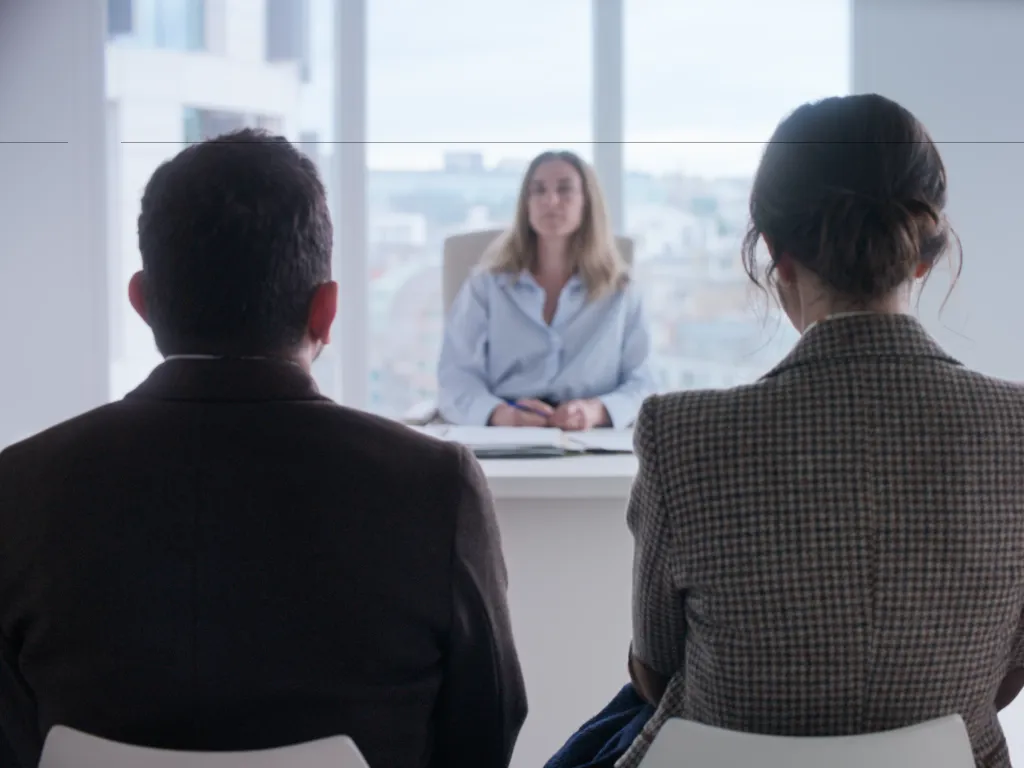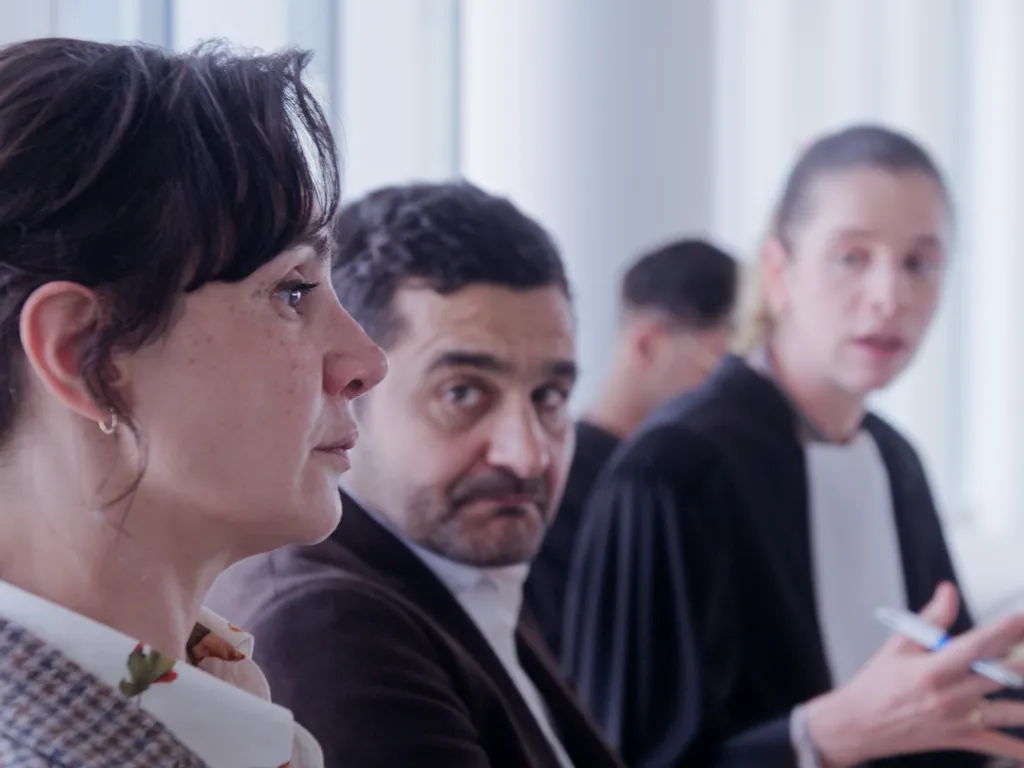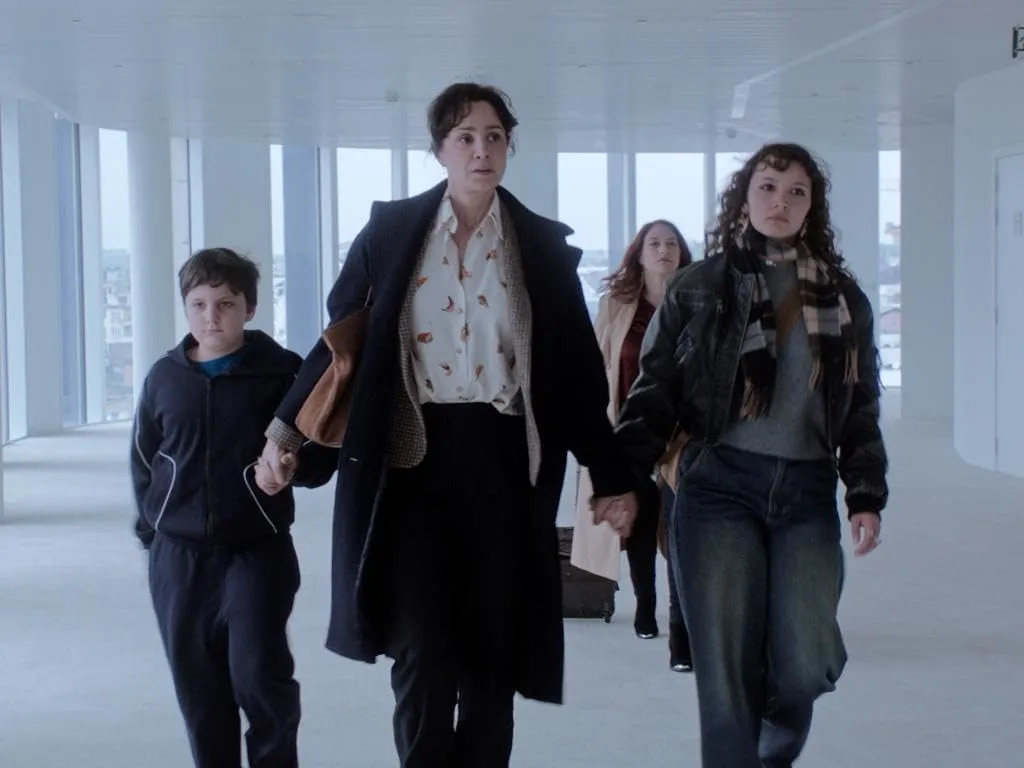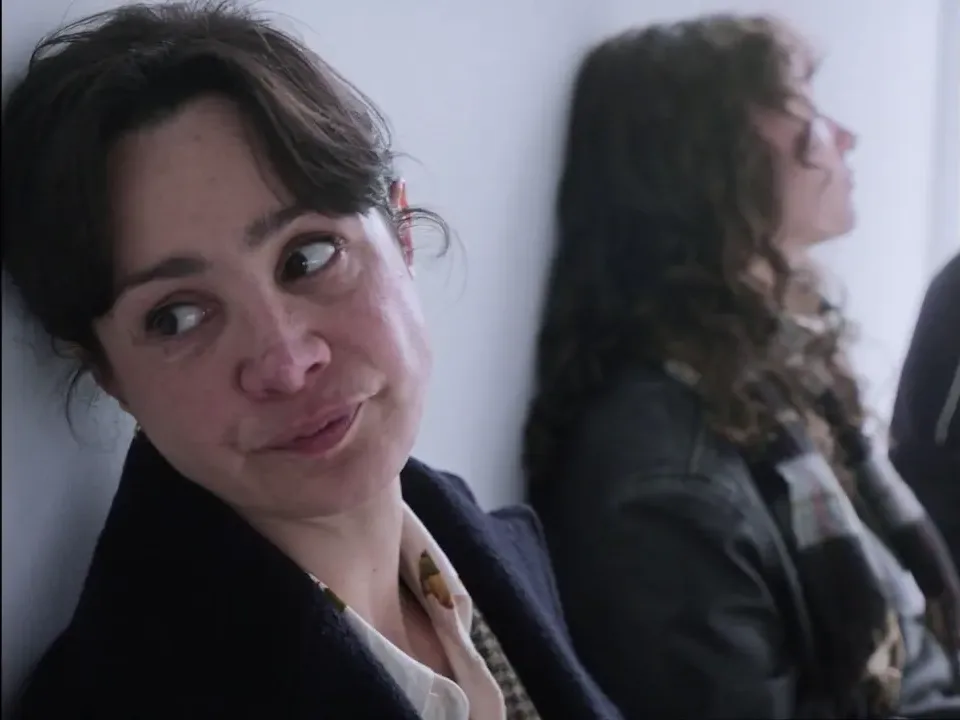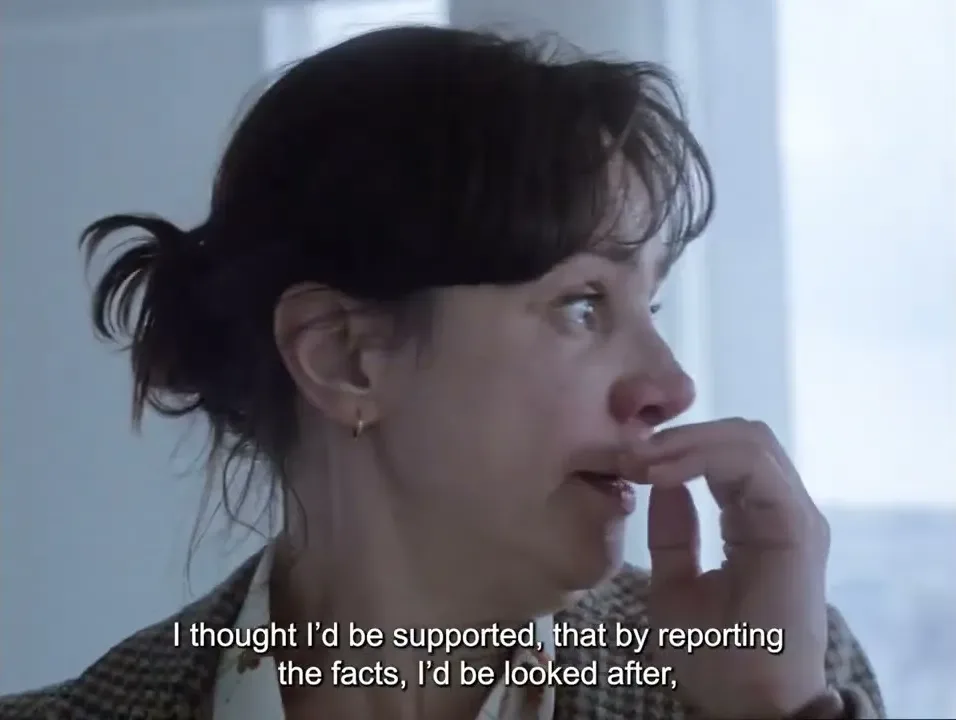We Believe You (On vous croit, 2025), debut feature by Charlotte Devillers and Arnaud Dufeys, assembles a family of witnesses into a haunting silent theatre of dread. Myriem Akheddiou anchors the frame as Alice, who drags her son Etienne (Ulysse Goffin) across a station platform into a custody hearing revived by fresh allegations of abuse.
Adèle Pinckaers grants Lila a stoic compassion, while Laurent Capelluto’s father hovers between denial and guilt. Natali Broods presides as the judge, her measured glances weighing each soul within a stark chamber. Their testimonies echo as whispered confessions.
Here, form collides with existential rupture. The camera shifts from restless handheld to rigid geometry, constructing a confine where testimony becomes ordeal. Every static shot poses a philosophical challenge: Can belief find footing in procedural stone? Alice’s fight for her children’s sanctuary becomes an exploration of faith and doubt.
Stakes distill to a single breath: maternal fervor against paternal claim, and a legal promise of equity shadowed by its silent scepticism. Each hushed exchange interrogates trust—who merits belief when trauma confronts reason?
Testimony in Motion: Narrative’s Slow Burn
The film thrusts us into chaos at a tram station, where Alice wrestles with Etienne’s panic. A restless camera hovers close, tracing her ragged breaths, until the boy’s outburst rings like a trial bell. Dialogue snaps—words splinter under pressure—and we exist inside a tense threshold. The opening feels less like exposition and more like a visceral overture, where every frame murmurs of unspoken anguish.
Inside the courthouse, space fractures. The waiting room becomes a liminal purgatory: distant figures behind glass, children clutching legal papers. Camera distances shift—wide to isolate, tight to suffocate—mapping alliances and fractures. Witness statements unfurl in alternating tableaux; counsel’s motions flicker like philosophical proposition and counterpoint. Two processes entwine: a youth-protection inquiry and a pending criminal indictment. Each testimony is a plank in a shifting bridge between belief and doubt.
Alice’s arc reverberates through procedural labyrinths. Every setback chisels her resolve; her eyes, raw with need, echo Kierkegaard’s fear and trembling. Etienne’s trauma speaks in silences—stifled sobs, vacant stares—while Lila offers fragile balm, a quiet dialectic between innocence and duty. The father’s voice, measured yet hollow at moments, leaves us perched on a moral fault line: is he wronged or willfully blind? Ambiguity hangs like smoke in the air.
Time here is merciless. Seventy-eight minutes unfold almost uninterrupted, forging real-time intensity that spares no solace. Cuts are scarce; even pauses smell of interrogation. The absence of narrative leaps forces us to inhabit every ticking second. Then, without dramatic flourish, a text-card slides in—cold statistics supplanting emotional resolution. This factual aftershock shatters cinematic illusion, reminding us that human suffering often remains unresolved.
Architects of Tension: Directing the Unseen
Charlotte Devillers and Arnaud Dufeys bring a clinician’s eye to the courtroom, shaping each shot with social realism born of healthcare experience. Their debut shifts from handheld immediacy—camera trembling with Alice’s panic—to composed tableaux that render every actor a living sculpture. In that transition, the film exposes how grief and guilt inhabit space as insistently as voices.
Pepin Struye’s lens drapes interiors in a near-monochrome palette. Stark lighting carves walls into shards of light and shadow, each high-contrast frame feeling both austere and alive. Courtroom exchanges unfold in shot–reverse–shot symmetry, as if each testimony mirrors a private confession.
When focus tightens on Alice’s face, her features tremble like inscribed text; reaction shots reveal concealed ruptures in other characters. Every lingered gaze becomes a philosophical question about whose suffering we choose to witness.
Mathilde Lejeune’s design reduces the courthouse to elemental geometry: glass partitions, polished benches, corridors that echo with unseen footsteps. Props—legal documents, a child’s drawing tucked into a folder—appear as relics of broken trust.
Words on paper carry as much emotional weight as the people who clutch them. In this pared-down world, tiny details bleed significance: a pen sliding across a table, the sheen on a vinyl chair. Space itself emerges as a character, one that judges and confines, alternately conferring power and vulnerability.
Embodied Testimonies: Flesh Against Procedure
Myriem Akheddiou’s Alice dominates the frame in a performance that feels like ontology in motion. Her face, a landscape of tension, shifts between defiance and fragility. In one silent stare, she becomes both guardian and supplicant—her laboured breathing a manifesto of maternal urgency. Those protective gestures, from cupped hands around her son to the sudden recoil at an unseen memory, resonate like existential pronouncements: What does it mean to shield another when the world demands proof?
Ulysse Goffin’s Etienne is trauma made visible. His tantrums erupt without warning; his silence after the storm holds even more weight. A twitch of his shoulder, the tightening of tiny fists—each becomes a syllable in an unspoken language of pain. At times he blinks away the camera’s gaze, as if reality itself is too bright to endure. He stands as testament to childhood betrayed, body and breath composing an unedited confession.
Adèle Pinckaers as Lila offers a subdued counterpoint. Her poise under crisis carries the grace of a mediator between worlds—tender yet firm, a necessary dialectic between disbelief and hope. When she places a hand on her mother’s arm, the moment transcends counsel; it becomes an ethical plea for empathy amid cold procedure.
Laurent Capelluto’s father moves like a question mark in human form. His measured calm can feel like armor or ambivalence; every pause invites doubt. Does he believe his own narrative, or is he constructing a self to survive scrutiny? That ambiguity pulses beneath his courteous veneer.
Natali Broods inhabits the judge’s role with silent rigor. A raised eyebrow, a patient nod—her minimal interventions shape the moral geometry of each hearing. And the lawyers, in their procedural niceties, offer dark levity: a pointed smile here, a clipped phrase there, reminding us that law, too, contains its own poetry of power.
Resonances of the Unheard: Score, Sound & Montage
Lolita Del Pino’s score drifts in like a hesitant whisper. Sparse piano motifs puncture the hush, each keystroke lingering as a question: What lies beneath this plea for belief? During testimony, music retreats further, leaving isolated notes to punctuate heavy silences. In those moments, the soundtrack feels less like accompaniment and more like an inner monologue—fragmented reflections of Alice’s mounting dread.
Ambient sounds become characters in their own right. Footsteps echo down linoleum halls, their cadence mimicking a heartbeat stilled by fear. The distant murmur of other proceedings seeps through glass walls, reminding us that countless stories unfold beyond the frame. A gavel tap cuts through the tension like a philosophical decree—justice rendered in a single, resonant click. These diegetic details coalesce into an auditory architecture that traps emotion within rigid walls.
Nicolas Bier’s editing orchestrates the film’s pulse. Reaction shots interrupt direct address, peeling back layers of stoicism to reveal the raw human beneath. In some scenes, Bier lets a single take stretch until unease becomes unbearable; in others, quick cuts shatter composure, shoving us from one anguished face to the next. This ebb and flow mirrors Alice’s inner landscape: rapid-fire anxiety followed by quiet, hollow respites.
Through score, sound design, and montage, We Believe You transforms courtroom procedural into a sensory crucible. We listen not just with ears but with bones, each auditory choice probing the spaces where legal certainty dissolves into existential doubt.
Between Law and Lament: Themes & Social Commentary
The film pits justice against procedure, exposing how rigid protocols can eclipse human empathy. Every objection and formal motion questions whether truth can survive the machinery of law. When Alice’s plea is met with measured skepticism, the courtroom feels less like a stage for vindication and more like an arena of existential doubt.
Motherhood here becomes duality: Alice as both nurturer and warrior. Her instinct to shelter her children collides with institutional scrutiny. In each measured question and pointed glance, we sense Simone Weil’s notion of affliction—how systems designed to heal can wound the very souls they vow to protect.
Voice and belief collide in a power struggle over spoken testimony. The youngest child’s silence weighs as heavily as any confession, while the title itself reverberates like a chant for survivors. Who holds authority in this chamber: law’s weighty gavel or the fragile breath of a traumatized child?
Bureaucratic indifference emerges as a lurking adversary. The echo of footsteps down sterile corridors hints at re-traumatization—the relentless protocol that demands proof of pain. We Believe You asks whether empathy can pierce procedural armor, or if compassion will remain an echo lost in the architecture of indifference.
Temporal Tightrope: Pacing’s Relentless Grip
In its lean 78-minute span, We Believe You forgoes every narrative detour. Each beat serves the ordeal; there is no room for digression. The film’s brevity feels like an indictment of time itself—every second counts, every pause a suspended judgment.
Tension swells during cross-examination, rising like storm clouds ready to burst. When Etienne’s voice fractures or Alice’s eyes brim, the camera holds until the air itself quivers. Between these peaks lie brief respites in waiting rooms, but those moments hum with dread rather than relief. Then, instead of tidy resolution, a stark text-card delivers statistical coldness—an emotional coup de grâce that reverberates longer than any witnessed exchange.
Viewers slip into Alice’s skin. Her mounting anguish becomes personal currency; doubt and faith tangle within us as if we, too, occupy that bench. The film refuses to hand down verdicts; ambiguity lingers, prompting each mind to weigh belief against procedure. Uncertainty becomes a mirror, reflecting how little we truly know when trauma meets rigid law.
After the credits, the hush persists. Questions about legal empathy and institutional indifference echo in silence. That final statistic, unadorned and factual, stakes a claim on reality: this drama extends beyond screen boundaries. The emotional residue compels us to reckon with systemic failings long after the last note has faded.
Full Credits
Directors: Arnaud Dufeys, Charlotte Devillers
Writers: Arnaud Dufeys, Charlotte Devillers
Producers: Arnaud Dufeys, Arnaud Ponthière
Cast: Myriem Akheddiou, Laurent Capelluto, Natali Broods, Ulysse Goffin, Adèle Pinckaers, Alisa Laub, Marion de Nanteuil, Mounir Bennaoum
Director of Photography (Cinematographer): Pépin Struye
Editor: Nicolas Bier
Composer: Lolita Del Pino
The Review
We Believe You
We Believe You delivers a stark, immersive encounter with trauma and justice, guided by exacting direction and Myriem Akheddiou’s upheaval of silent agony into vocal demand. Its disciplined runtime and austere visuals forge a raw emotional crucible, pressing us to question how belief is granted or denied.
PROS
- Myriem Akheddiou channels raw emotion with unflinching presence
- Direction and framing amplify existential tension
- Minimalist score and sound design heighten every heartbeat
- Tight 78-minute runtime sustains unbroken suspense
- Thematic focus on belief and doubt resonates deeply
CONS
- Sparse narrative relief can feel relentless
- Ambiguous father figure may frustrate viewers seeking clarity
- Sterile courtroom setting might feel claustrophobic
- Text-card epilogue offers data but little emotional closure









































